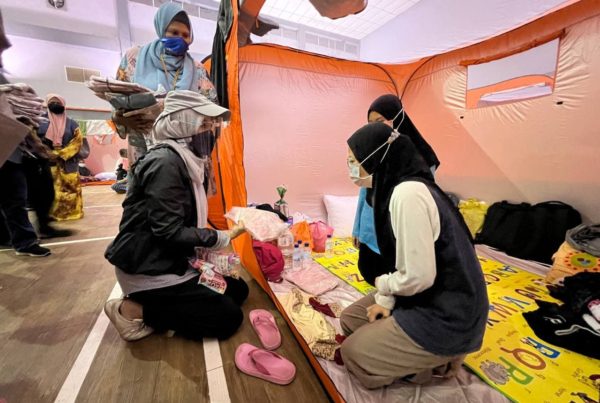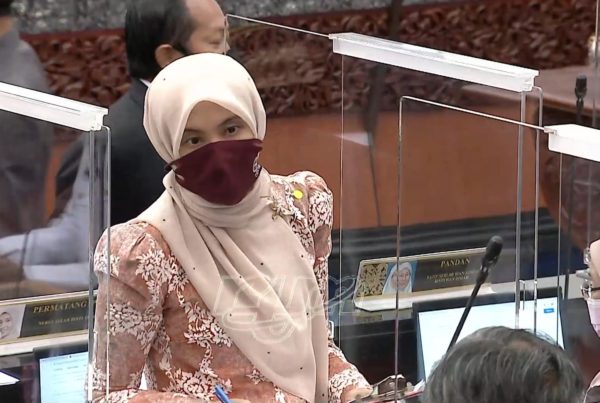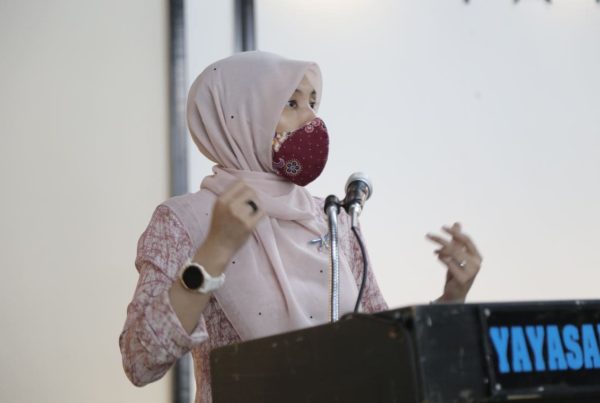Nurul Izzah Anwar, 2nd Febuary 2015
International Youth Gathering @ Hotel Flamingo,Ampang
Introduction
It is truly a pleasure and honor for me to share with all of you some of my thoughts this evening.
Certainly, discourse and knowledge continue to nourish one‟s soul – especially one that belongs to politics. And in this regard, I owe ABIM – our gracious host this evening – very much indeed – for having planted the seeds of understanding of the maqasid specifically through the lecture by one of its luminaries, Dato Dr Siddiq Fadzil. Although there is something to be said about the time slot they gave me; Datuk Seri Anwar Ibrahim informed me that if you get a 530 pm slot then the organizers must be enjoying a prank on you! Well as part of the ABIM family, I shall say, Jazakallah!
I begin by quoting Ibn Al-Qayyim with regards Islamic Law: “Shariah is based on wisdom and achieving people‟s welfare in this life and the afterlife. Shariah is all about justice, mercy, wisdom and good. Thus, any ruling that replaces justice with injustice, mercy with its opposite, common good with mischief, or wisdom with nonsense , is a ruling that does not belong to the Shariah, even if it is claimed to be so according to some interpretation.”
Last year, Professor Hossein Askari from George Washington University concluded in his research on Islamicity Index that none of the Islamic countries are adhering to the tenets of the Quran. As a matter of fact the top ten countries in his survey are all so called Christian countries, with Ireland topping the list. The highest ranked Islamic country, and this should not be a point of pride, is Malaysia, at 33.
The Islamicity Index looks at factors such as laws and governance, human and political rights, international relations, and economics.
However, the The Economist Intelligence Unit‟s (EIU) survey of 167 countries has concluded in Malaysia ranking at number 67; as we are categorised as a “flawed democracy” – with most opposition members of parliament including the Opposition Leader facing the risk of going behind bars. It is of no surprise we are behind Indonesia and the Philippines. Something is clearly wrong here.
Upholding Maqasid, Continuous Ijtihad, Ethics of Ikhtilaf (disagreement) and Spirit of Islah (Reform).
We are indeed facing serious challenges in the realm of governance and politics. As questioned by Dr. Jasser Auda: Where is wisdom and people’s welfare, which every Muslim knows is the basis of the „Islamic Law‟?
Looking at the basic set of maqasid that prevails in the traditional sense – they are divided into three levels of necessity, which are: necessities (daruriyyah); what preserves one‟s faith, soul, wealth, mind and offspring, and in others, preservation of honor needs (hajiyyah); that acts as a shield of protection to the level of necessities and (tahsiniyyah); beautifying or comforting purposes.
But what was luxurious then could easily be a necessity now. In Malaysia for example, debate revolves around the decision by the government to tax important medicines and books under the GST regime – which some would argue are basic necessities versus their decision to exempt luxurious lobsters.
As such my position is our need to reframe our roles as Caliphs of Allah in the provision of Rahmatan lil „Alamin. For me, the current concept most fitting to use as Caliphs is as a Muslim Democrat.
We must ensure the Muslim Democrat rises up to the challenge in bringing back both wisdom and people‟s welfare – as core elements of Islamic Law.
A Muslim Democrat is someone who upholds the maqasid. The term maqasid refers to a purpose, objective, principle, intent, goal behind Islamic ruling.
A Muslim Democrat is someone who uses his or her creativity, intelligence, experience and wisdom to perform continuous ijtihad (independent reasoning).
A Muslim democrat is someone who engages all stakeholders in society through contestation of ideas and managing the ideas through ethics of Ikhtilaf (disagreement).
And finally, a Muslim Democrat is someone who has the optimistic, realistic yet idealistic perspectives by being forward looking rather than reliving the past by having the spirit of islah (reform).
CHALLENGES OF A MUSLIM DEMOCRAT
Are we fixated over content rather than context? Historical, unilateral & arbitrary opinions about closing the door of Ijtihad should not be binding on new and future generations. Ibnu Sina remarked that: “Since temporal conditions change and new problems are continuously coming to the fore, it is necessary that in every age and in every period there should be persons who have complete knowledge and acquaintance with Islamic matters, and who can be the answerers to the needs of Muslims with attention towards the new problems that come forward in every age.”
We, as Muslim Democrats must push forward that debate be done in an ethical manner as stipulated by Sheikh Taha Jabir Al Alwani‟s The Ethics of Disagreement (Adab Al-Ikhtilaf). This treatise explains the etiquette envisioned by Islam for all those engaged in discourse and intellectual dialogue. The book leads us to the principles and purposes of the Shari’ah, which provide Muslims with perspectives far greater than those afforded by pedantic debate over points of law and procedure, or fine distinctions between conflicting theological arguments.
Just to give you a sense on what the sets of priorities are for a Muslim Democrat; and the choices of maqasid that we make, I begin with the question: What is the bigger problem affecting the ummah?
The issue of Allah used by people of other faiths or; the issue of blatant corruption that can easily spell the economic death of a nation?
We must also be process driven. Maqasid is an overriding ethos that guides us all. however it is important for us to be focussed on the details of reform and change so that maqasid doesnt remain a pipe dream.
Brothers and sisters, experience has shown that long immersion in futile debates will produce minds that are incapable of understanding real situations and making value judgments on changing circumstances and needs.
CENTRALISATION VS DECENTRALIZATION OF RELIGION
One of the biggest challenges that is facing Muslims is the Centralisation of power, or the institutionalisation of religion. Religion should never be merely centralised, because it opens up the opportunity for religion to be abused.
Religious institutions must be liberalized so they are free from the shackles of any political elite or structure. One just needs to look at the Mamluk era which spanned the 12th to the 18th centuries to understand how a properly planned waqf system can finance religious and educational institutions such that their independence as well as credibility is retained throughout.
Unfortunately, in the current era most religious institutions continue to exist due to the political masters‟ constant financial support. As muslims we must have moral authority so that we can lead. We can gain this through maqasid.
Flawed institutions merely reiterate the need to polarize and deflect blame. The need for personal reform is often delayed or ignored; and focus is often on Western faults, flaws and victimization of Muslims worldwide – which are valid, yet misses the point of self renewal.
As such, the current climate then opens up the accusation that religion is being used as a mere tool for political control. What we need to start thinking about is empowering muslims with knowledge so that they are capable of making their own inferences on issues that they face. We must be based on inclusiveness and common universal values. We must look towards the future.
Faith is a personal journey and institutionalising religion reduces our time discovering God. There is much more that needs doing rather than mere identification of just halal and haram.
FUTURE VS RELIVING THE PAST : Fiqh Tawaqqu’
Sheikh Abdullah Ben Bayyah has said that forward thinking, or thinking about the implications of any action in any given situation, or known as „Ma‟alat al-Af‟al‟ is the basis of Fiqh Tawaqqu‟.
Fiqh Tawaqqu‟; means prediciting the outcome of a certain action based on either empirical or anecdotal evidence, or based on experience.
Thus, we must always strive to think and act accordingly today, in order to preserve or make the future better for all of us. Just because we have to learn from history does not mean that we must relieve the past. Our past experiences should bring forth a new way of thinking, acting differently to strive for a new outcome.
This can be in the form of Islah, or in the context of our country, reform that is needed in many aspects of governance.
Unfortunately, the people who walk within the corridors of power fail to realise that the political landscape of the country has changed; the era of a know-it-all government as all but past.
The Program for International Student Assessment (PISA) and Trends in International Mathematics and Science Study (TIMMS) rankings are consistently falling down every single time the reports are out.
As an example, the Pentaksiran Tingkatan 3 (PT3) results last year has proven what those international tests have told us long ago, that our education system is at its weakest moment, despite previously boasting the ever increasing number of students who managed to score all A‟s in the PMR or SPM examinations. Our students can‟t even compete regionally, even when compared to relatively poorer countries like Vietnam. The top 90 percentile of schools in Malaysia is equal to the bottom 20 percentile of schools in South Korea and Singapore.
I have called upon the government many times to reform and revamp, or at the very least set up a National Consultative Council on education that will take into account the views of every stakeholder, even the opposition members of parliament.
However, the culture of “us vs them” politics remains prevalent, we are unable to come out of this cocoon, too busy reliving the past glories, without thinking of the implications this might have in the future. What you have is continuous persecution and prosecution against those who dare to criticize government policies and leaders.
Additionally, Malaysia must also address issues affecting the plight of minorities. As mentioned by Dr Tariq Ramadan just yesterday: “I‟m sorry but some of your fellow citizens in this country who are not Muslims are facing this discrimination, they are facing injustices,” “If you want to be good Muslims, instead of preventing people from believing, you become better believers. Don‟t be scared of people who are not Muslim. Be scared, be afraid, be worried about our own lack of consistency.”
As such, I can conclude that we are responsible for the use of time using the Fiqh Tawaqqu‟ approach, and fight a jihad through the reforms that we need in the country, in our mission to build a better life using Maqasid.
SOLUTIONS
How can Muslim democrats build a better world? While maqasid refers to a purpose, objective, principle, intent, goal or end. And as Muslim, politicians & policymakers, we have no choice but to widen the scope of the maqasid beyond the individual to one that encompasses the community, nation, and humanity, in general.
Some universal maqasids include viewpoints by Rashid Rida, who identified the following maqasids: ‘reform of the pillars of faith and spreading awareness that Islam is the religion of pure natural disposition, reason, knowledge, wisdom, proof, freedom, independence, social, political and economic reform, and women’s rights.’
Similarly Sheikh Yusuf Al Qardhawi included the following as universal maqasids: “Preserving true faith, maintaining human dignity and rights, calling people to worship God, purifying the soul, restoring moral values, and treating women fairly, building a strong Islamic nation and calling for a cooperative world.”
And as such, as we embrace the new era of the 21st century, it is only fitting that we adopt and embrace the new universal maqasids from contemporary scholars such as Dr Rashid Rida and Sheikh Qardhawi.
In fact it was ABIM that popularized not only Sheikh Qardhawi’s viewpoint and position vis-a-vis the maqasid, as well as the jurisprudence of priorities (fiqh al awlawiyat) – even before it became more of a common topic for discussion.
In 1996, Former ABIM President Ahmad Azam welcomed the treatise on Fiqh Al Awlawiyat by Sheikh Qardhawi, specifically a title within the book narrating the relationship between the Jurisprudence of Priorities (Al Awlawiyat) with Maqasid Shariah.
Yesterday Prof. Tariq`Ramadhan reminded us, “The fixation among some sections of the Muslim community to dish out punishment in the name of Islam goes against the understanding of the religion.” Living in the past means adopting the politics of dispossession, carrying a historical baggage that will become reactionary extremism.
We must be more proactive in pushing back against prevailing narratives that do not help.
We need to take heed of what Tareq Suwaidan has said, that among one of the Islamic world’s weaknesses now is not empowering women’s role in society. I call for us to work hard to provide the conducive environment for empowering women.
In the year 2012 alone, there were 2,964 rape cases and according to Women‟s Aid Organisation Malaysia (WAO). Out of 10 reported cases of rape, 9 will go unreported. Looking at this number, this means that there are close to 81 rape cases a day! And at least one incest case per day. This is unacceptable. How can we let this continue to happen?
We have to continue enforcing and ensuring safety for women in Malaysia, not to mention the rest of the world.
A study by Reuters has placed Kuala Lumpur as the 7th most dangerous city of 16 major cities surveyed in the world. This has to stop. We need to put in place regulations, legislation and follow through action that protect women at work.
According to the Household Index Survey, the number of earners in one household is 1.8, this means that majority of houses have working husband and wife. This is the reality that we as Muslim Democrats have to accept and work out solutions for.
Human development and the welfare of human beings have a pivotal place in Islamic development concept. Majority of Islamic scholars come to the conclusion that the objective of the Shari‟ah (Maqasid al-Shari‟ah) is to promote well-being of all mankind, which lies in safeguarding faith, their human self, their intellect, their posterity and their wealth. Consequently, the human development in Islamic perspective must be based on Maqasid al Shariah.
ABIM, being the stellar organisation that is brimming with hope in realizing a new future conducive for Muslim democrats, must continue to take the lead in propagating the right maqasid shariah.
Looking at our position in the Islamicity Index, we are already far ahead of the other Islamic countries. What we need to do now is to find out the essence of the Quran that countries like Ireland practices. And how we should implement these back home to ensure that Malaysia truly becomes the model Islamic nation. We cannot afford to let Malaysia become Islam only by name. With a severely lackadaisical attitude towards a just society and good governance.
And going back to the Islamicity Index, what impact has it had on Malaysia? Nothing, really.
Except for Malaysia‟s first-ever “syariah index” – which the Prime Minister hopes will be adopted by other Muslim nations.
Now shockingly we find that the index will have special emphasis on five issues relating to maqasid, which includes a rather questionable reference to „ancestry‟ or simply put, race. The original historical context is of the preservation of offspring or progeny (e.g. Islam protects man‟s honour and prevents lineage confusion by encouraging marriage and advocating family institution. This is to ensure procreation of generation within the Shariah boundary and at the same time prohibits adultery or illicit sex – zina). I have NO idea which contemporary accepted Islamic scholar would include „race‟ as a maqasid. And someone has even updated Wikipedia to reflect this newly adopted definition of maqasid.
The Prophet in his final sermon has said that, “All mankind is from Adam and Eve, an Arab has no superiority over a non-Arab nor a non-Arab has any superiority over an Arab; also a white has no superiority over a black nor a black has any superiority over a white – except by piety and good action.”
We find from the al-Tahrir wa al-Tanwir tafsir by Ibnu Asyur that explains the Devil‟s rejection towards Adam is based on his form of racism: From Al-Isra: 61: And [mention] when We said to the angels, “Prostrate to Adam,” and they prostrated, except for Iblees. He said, “Should I prostrate to one You created from clay?” (kitab Tanwir Tafsir – Ibnu Asyur, Tafsir Al Qurtubi, Tafsir Al Kashaf)
Either way, it is ironic to note the Premier of a Malay Race-based Party (Ketuanan Melayu) feels that he has a right to talk about Maqasid Shariah. Islam can never be used to justify a race based or racist agenda.
I am also confounded by the fact that Malaysia chooses to ignore Islamic world opinion makers such as Rashid Rida’s and Sheikh Yusof Al Qardhawi‟s suggestions for universal maqasids. The gauntlet, ladies and gentlemen must then be thrown down, and accepted by ABIM. Because as changemakers who have set the massive tone of Islamic discourse in this country, ABIM must also appeal to the senses of the country‟s policymakers to bring forth maqasids that are in line with Malaysia’s multiracial needs; inclusion of women in participatory decision making, addressing the deepening inequality in wealth and ensuring social justice, human dignity and democratic space are realized in this Muslim populated nation so we can have indexes that are Islamic because they provide wisdom and welfare for the people; not mere indexes that pander to certain narrow set of electorates which is neither Islamic nor wise nor right. And a Malaysian government that claims to be Islamic should not continue to persecute opposition politicians and general dissenters.
I hope ABIM remains steadfast with its noble efforts – in changing mindsets, aspirations and unleashing the beauty of Islam; providing wisdom and preserving people’s welfare.



